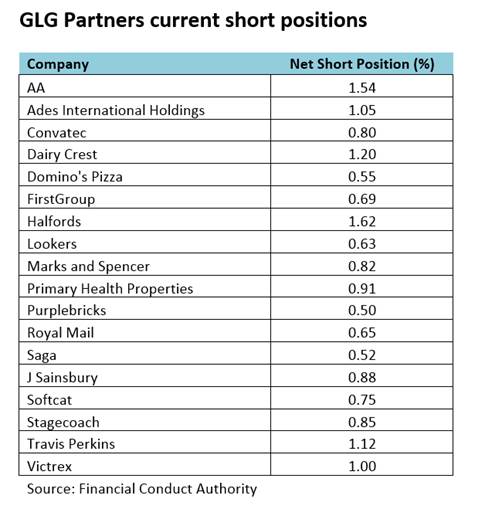A debt warning and short selling
11th October 2017 11:37
by David Brenchley from interactive investor
Most investors - institutional and retail - try to make money on the stockmarket the conventional 'long' way, by buying shares in companies then selling at a higher price. However, others have a second tool in their armoury - shorting. It's typically associated with the hedge fund industry, but other asset managers like the flexibility of long-short funds, too, and we're seeing more of it.
Long-short funds can sell company shares as a bet on the price falling. They loan, or 'borrow' the stock and sell at the current market price, with the idea that they can buy the shares back at lower price sometime in the future to replace the borrowed shares.
One recent high-profile example is , which has been heavily shorted by fund managers. When it warned on profits back in July the shares plunged, enabling those 'shorters' to lock in substantial profits by buying back the shares at knockdown prices.
Other high-profile shorting strategies still run by hedgies include , , , , and . It's worth watching these stocks as, when/if the worm turns, a rush to cover (buy back) short positions can trigger a 'short squeeze'. This large-scale buying can result in a substantial and rapid surge in the share price.
A manager that runs one of these funds has just spoken about his reasons for shorting companies - and it paints a gloomy picture for the UK market.
Jack Barrat is manager of the Man GLG Absolute Value fund, launched in July to take long and short positions in UK mid-cap equities.
Speaking at an event in London Tuesday, Barrat pointed out that the ratio of net debt to EBIT for the UK market (ex-financials) as a whole has rocketed since the Credit Crunch. What's more, he believes the quality of earnings of UK companies is at the "lowest point it has been since the financial crisis".
According to Barrat, the EBIT - or operating profit - performance of the UK market peaked at around £220 billion back in 2011. By 2016, that number had fallen by almost a quarter to £170 billion.

At the same time, net debt held by UK companies has rocketed and is expected to top £500 billion for the first time in 2017. This means the UK market has gone from a net debt-to-EBIT ratio of 1.2-1.3 times in 2011 to 2.5 times now.
"The earnings performance of the UK market in total has been very, very lacklustre, I think in the last 10 years but especially in the last four or five," Barrat said.
The difference between companies' reported earnings and companies' adjusted earnings is now higher than ever before. Adjusted earnings, Barrat explains, are "the earnings that management would very much like to talk about and are after adjusting for a huge amount of things".
"The reason that is important is that cash earnings - and remember it's cash that repays the debt, it's cash that pays the dividend and it's cash that, eventually, you earn as shareholders - is much more closely aligned to the statutory [reported] earnings figure than it is the adjusted earnings figure."
So, he adds, "not only is net debt to EBIT high, [but] that EBIT is normally given as an adjusted number. The actual statutory number currently is about 30% below that."
Who's at fault?
Barrat says that, on the whole, the companies that were burnt during the financial crisis have, by and large, repaired their balance sheets and grown their earnings, "whereas those that sailed through this era untouched have blown their balance sheets and shrunk their earnings".
He pinpoints oil and gas companies as the biggest driver of both the decline in earnings and rise in debt. However, it is happening across the board, more or less. "You've had consumer staples companies doing it [and] you've had pharmaceutical companies doing it.
" was on 8-9 times PE with a net cash balance sheet four years ago - you're now looking at 18 times because the earnings have fallen, but they've now managed to find themselves with a £15 billion debt pile through acquisitions as well."
Why is this important?
Investors need to be mindful of a rise in debt built up by the companies they invest in, or are considering investing in. This is because debtors sit above equity holders in the capital structure, so get repaid first if things go wrong.
As Barrat reminds us, "eventually at some point that debt has to be repaid."
This article is for information and discussion purposes only and does not form a recommendation to invest or otherwise. The value of an investment may fall. The investments referred to in this article may not be suitable for all investors, and if in doubt, an investor should seek advice from a qualified investment adviser.